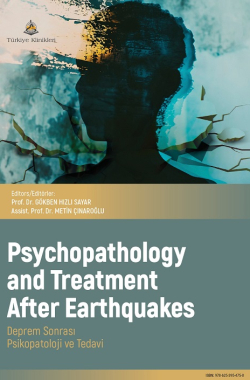Mental Health Strategies and Services for Earthquake’s Victims
Demirkan Samsun LIV Hospital Department of Psychiatry, Samsun, Türkiye
Demirkan AK. Mental Health Strategies and Services for Earthquake’s Victims. Hızlı Sayar G., Çınaroğlu M ed. Psychopathology and Treatment After Earthquakes. 1st ed. Ankara: Türkiye Klinikleri; 2025. p.39-44.
ABSTRACT
Disasters, both natural and human-induced, disrupt societies by causing substantial physical, economic, and social losses, especially for segments lacking sufficient coping capacities. This chapter outlines the necessity of flexible, dynamic post-disaster mental health strategies to address the unpredictable nature of disasters and the varied needs of victims, ranging from direct survivors to those indirectly affected through media exposure.
In the immediate aftermath, mental health services must connect with emergency institutions to organize crisis-oriented responses. Attention is particularly focused on the impact phase where survivors require urgent mental health interventions alongside rescue and recovery efforts. Primary concerns include the continuation of existing psychiatric services, provision of medical drugs, and treatment of acute mental disorders. Establishing temporary workspaces for mental health professionals becomes essential when typical facilities are compromised.
As the situation progresses into the short-term and long-term phases, the focus shifts to addressing ongoing and emerging mental health issues, such as PTSD, depression, and anxiety. Strategies include utilizing cognitive behavioral approaches, psychopharmacological treatments, and community-based interventions like group, family, and child therapy. Additionally, training non-specialists like primary care providers in disaster mental health is emphasized to extend the reach and effectiveness of interventions.
Throughout the phases, maintaining communication, offering guidance, and integrating services with ongoing public health efforts are crucial for effective mental health management post-disaster. The chapter advocates for a comprehensive approach that includes not just immediate responses but also preventive measures and long-term support systems to manage the psychological aftermath of disasters effectively.
Keywords: Disaster medicine; Mental health services; Post-traumatic stress disorder; Crisis intervention, Emergency medical services
Kaynak Göster
Referanslar
- AFAD (2023a). Açıklamalı Afet Yönetimi Terimleri Sözlüğü. [Link]
- Taylor, A. J. & Frazer, A. G. The stress of post-disaster body handling and victim identification work. Journal of human stress 8, 4-12 (1982). [Crossref] [PubMed]
- Cohen, R. E. Reacciones individuales ante desastres naturales. Boletín de la Oficina Sanitaria Panamericana (OSP);98(2),feb. 1985 (1985). [Link]
- Cohen, R. E. Mental health services for victims of disasters. World psychiatry : official journal of the World Psychiatric Association (WPA) 1, 149-152 (2002). [PMC]
- Math, S. B., Nirmala, M. C., Moirangthem, S. & Kumar, N. C. Disaster Management: Mental Health Perspective. Indian journal of psychological medicine 37, 261-271 (2015). [Crossref] [PubMed] [PMC]
- Cohen R. Mental health services in disasters. Workers and instructors guide. Washington: Panamerican Health Organization, 2000. [Link]
- Kim, Y. & Akiyama, T. Post-disaster mental health care in Japan. Lancet (London, England) vol. 378 317-318 (2011). [Crossref] [PubMed]
- Raphael B. When disaster strikes: how individuals and communities cope with catastrophe. New York: Basic Books, 1986. [Link]
- Wentraub P, Hall H, Pynoos R. Columbine High School shootings: community response. In: Shafi M (ed). School violence: assessment, management, prevention. Washington: American Psychiatric Press, 2001:129-61. [Link]
- Suzuki, Y. & Weissbecker, I. Post-disaster mental health care in Japan. Lancet (London, England) vol. 378 317 (2011). [Crossref] [PubMed]

